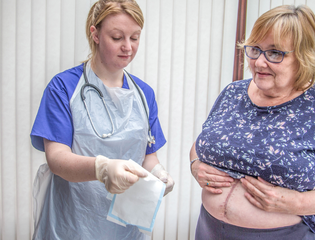NEW IMMUNOTHERAPY COMBO OFFERS HOPE FOR WOMEN

Exciting immunotherapy breakthrough could open up new treatment options for ovarian cancer patients
For the first time ever, a new type of treatment called immunotherapy has been shown to help women with platinum-resistant ovarian cancer live longer. This type of cancer is especially difficult to treat, so the news represents a significant step forward - and a reason to feel hopeful.
The breakthrough comes from a major clinical trial that tested a mix of immunotherapy and chemotherapy. Specifically, researchers combined pembrolizumab (you might know it as Keytruda) with weekly doses of paclitaxel, a standard chemotherapy drug. Some women also received bevacizumab (Avastin), which helps block the growth of blood vessels that feed tumours.
The results? Women who received the combination lived longer than those who had chemotherapy alone. And importantly, no unexpected side effects were found - so it’s not just more effective, it’s also safe.
There are many different types of immunotherapy. Pembrolizumab is what’s known as an immune checkpoint inhibitor, which has been a huge breakthrough in treating lung and skin cancer.
This is the first time an immune checkpoint inhibitor like pembrolizumab – or any immunotherapy - has shown a survival benefit for women with ovarian cancer. It’s a really big deal.
"This feels like a breakthrough moment – the first time immunotherapy has been shown to improve survival for women with ovarian cancer. For those who’ve run out of options after chemotherapy, it offers long-overdue hope.”
Why it matters
Platinum-resistant ovarian cancer is one of the most challenging forms of the disease. 70% of women diagnosed with ovarian cancer have their disease come back after their first treatment – and when it does, it has evolved to the point where those treatments are no longer effective.
These new findings offer hope that combining immunotherapy with chemotherapy could help more women live longer - and with fewer side effects.
Although pembrolizumab isn’t currently approved for ovarian cancer, this research is expected to influence future treatment guidelines and spark new trials. It’s a sign that progress is being made, and that better options may be on the horizon.
About the study
This was a large, rigorous phase 3 trial involving around 640 women with recurrent ovarian, fallopian tube, or primary peritoneal cancer. It was double-blind and randomised - meaning neither the patients nor the doctors knew who was receiving the new treatment, which helps reduce bias and strengthen the results.
Participants received pembrolizumab every six weeks, alongside weekly paclitaxel, with or without bevacizumab. The outcome? A clear improvement in overall survival compared to chemotherapy alone.


